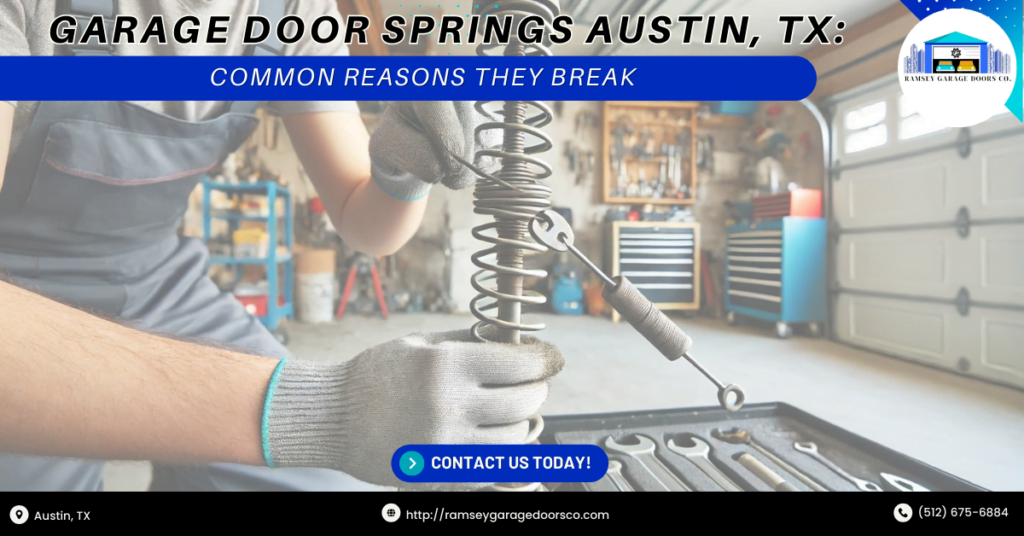
Garage Door Springs Austin, TX: Common Reasons They Break
Discover the common reasons why garage door springs break and how to prevent it. Learn about garage door spring replacement in Austin, TX, from Ramsey Garage Doors Co., your local experts in garage door repair and maintenance.
Ever faced the frustration of a garage door that refuses to budge? One common culprit: broken garage door springs. Understanding why these critical components fail can save you time, money, and a lot of stress. Let’s delve into the myriad reasons why garage door springs break in Austin, TX, and how to keep them in top condition.
The Vital Role of Garage Door Springs
Garage door springs are the unsung heroes of your garage door system. They bear the door’s weight, making it easy to lift and lower. Without functional springs, the door would be cumbersome, if not impossible, to operate. These springs store mechanical energy when the door is closed and release it as the door opens, counterbalancing the door’s weight. Their role is crucial not just for convenience but also for safety. A broken spring can lead to an unbalanced door, posing a significant hazard to anyone nearby.
Types of Garage Door Springs
Torsion Springs
Torsion springs are mounted horizontally above the garage door opening. They twist and coil to generate the necessary force to lift the door. Known for their durability, torsion springs can handle significant weight and stress. These springs are typically used in heavier doors due to their robust nature. However, they require precise installation and maintenance to ensure optimal performance and longevity.
Extension Springs
Extension springs, positioned on either side of the garage door, stretch and contract to provide lifting force. While they are typically less expensive than torsion springs, they are also more prone to wear and tear. These springs are often used in lighter garage doors. Despite their affordability, they require careful monitoring as they can become dangerous if they snap.
Mechanical Fatigue and Wear
Daily Operational Strain
Every time you open and close your garage door, the springs are put under immense pressure. This daily operational strain leads to mechanical fatigue over time. Imagine the springs flexing and relaxing thousands of times; it’s no wonder they eventually give out.
Lifespan Expectations
Most garage door springs are rated for about 10,000 cycles (a cycle being one full opening and closing of the door). Depending on usage frequency, this could mean your springs last anywhere from 5 to 15 years. High-usage households or commercial properties might find their springs wearing out sooner. Regular checks can help anticipate when replacements might be necessary.
Lack of Regular Maintenance
Importance of Inspections
Regular inspections can catch issues before they escalate. Look for gaps in the coils, rust, or other signs of wear. Consistent checks can identify minor issues early, preventing costly repairs or replacements down the line. Additionally, professional inspections can reveal hidden problems that might not be visible to the untrained eye.
Lubrication and Adjustment
Proper lubrication reduces friction and wear. Ensuring your springs are correctly adjusted can prevent uneven tension and premature failure. Lubrication should be a part of your routine maintenance schedule, ideally done every six months. Adjustments, particularly of torsion springs, should be left to professionals to avoid potential injuries.
Environmental Factors
Impact of Humidity and Rust
Austin’s humid climate accelerates rust and corrosion, weakening the springs. Rust creates friction points that exacerbate wear and tear. The moist air can cause the metal to deteriorate faster, making it essential to use rust-resistant materials and keep the springs well-lubricated.
Temperature Extremes
Fluctuations in temperature cause the metal in springs to expand and contract. This constant stress can lead to metal fatigue and breakage. Austin’s hot summers and cooler winters can exacerbate these issues, making it crucial to monitor and maintain your springs regularly.
Improper Installation Techniques
Common Installation Errors
Incorrect installation can lead to uneven wear on the springs. Misalignment or improper tensioning are common errors that reduce spring lifespan. These mistakes often arise from DIY installations or hiring inexperienced technicians. Such errors can result in the door becoming unbalanced or placing excessive stress on the springs, leading to premature failure.
Professional Installation Benefits
Hiring a professional ensures your springs are installed correctly, balanced properly, and adjusted to the right tension, preventing premature failure. Professionals have the tools and expertise to handle installations safely and efficiently, ensuring the longevity of your garage door system.
Overloading the Garage Door
Exceeding Weight Limits
Garage doors have specific weight limits, and exceeding these can strain the springs. This often happens when homeowners add insulation or other materials to the door. Overloaded springs work harder, which accelerates wear and tear. It’s crucial to consider the total weight, including any modifications, to prevent overloading.
Proper Spring Selection
Choosing the correct spring for your door’s weight is crucial. Professionals can help determine the right type and capacity for your specific door. Using springs that are not designed for the door’s weight can lead to imbalanced doors and an increased risk of spring failure.
Manufacturing Defects
Identifying Faulty Springs
Sometimes, springs fail due to manufacturing defects. These can include substandard materials or poor construction. Identifying a faulty spring early can save you from unexpected breakdowns. Signs of defects include irregular wear patterns or cracks in the metal.
Warranty Considerations
Ensure your springs come with a warranty. Quality manufacturers stand behind their products and offer replacements for defective springs. A good warranty can provide peace of mind, knowing that you are covered if the springs fail prematurely.
Accidental Damage
Common Accidents Leading to Spring Breakage
Accidents happen. Sometimes, a car bumps the door, or an object strikes the springs. Such impacts can cause immediate or delayed spring failure. Physical damage can compromise the integrity of the springs, making them more susceptible to breaking under normal use.
Prevention Tips
Be mindful of what’s near your garage door. Avoid parking too close and keep the area around the springs clear of objects. Educate family members about the importance of handling the garage door with care to prevent accidental damage.
Signs of Failing Garage Door Springs
Visual and Audible Indicators
Signs of failing springs include gaps in the coils, rust, and an uneven door. You might also hear a loud bang when spring breaks. These indicators can help you identify problems early, allowing for timely repairs or replacements.
When to Seek Professional Help
If you notice any of these signs, it’s time to call a professional. Continuing to use a door with failing springs can be dangerous. Professionals can assess the situation and provide the necessary repairs to ensure your door operates safely.
FAQs
What are the signs that my garage door springs need replacing?
Common signs include visible gaps in the springs, a garage door that feels heavy, or a door that doesn’t open smoothly. If you hear a loud bang, it might indicate a broken spring.
Can I replace my garage door springs myself?
While DIY enthusiasts might be tempted to replace springs themselves, it’s highly recommended to hire a professional due to the high tension in the springs, which can cause serious injury if handled improperly.
How often should I have my garage door springs inspected?
Regular inspections every six months can help catch issues early. If you use your garage door frequently, consider more frequent checks.
Conclusion
Understanding the common reasons why garage door springs break can help you avoid the inconvenience and potential danger of a malfunctioning garage door. Regular maintenance, proper installation, and being mindful of your door’s weight limits are key factors in ensuring your garage door operates smoothly and safely for years to come. By keeping an eye out for signs of wear and tear, such as visible gaps in the springs, rust, or uneven door movement, you can address issues before they become major problems.
At Ramsey Garage Doors Co., we believe in the importance of preventative maintenance and professional service. Our team of experts is dedicated to providing top-notch garage door spring replacement in Austin, TX, ensuring that your garage door remains reliable and safe. We understand the unique challenges that Austin’s climate and usage patterns can present, and we tailor our services to meet these specific needs.
Whether you reside in the bustling heart of downtown Austin, enjoy the eclectic vibes of South Congress, or live near the tranquil beauty of Zilker Park, we are here to assist you with all your garage door needs. From residential garage door repair to commercial garage door repair, emergency garage door repair, and even new garage door installation, we have the expertise and experience to handle it all.
Maintaining a functional garage door is not just about convenience; it’s about safety and peace of mind. A broken spring can pose significant risks, and addressing it promptly can prevent accidents and costly repairs. By choosing Ramsey Garage Doors Co., you are opting for quality, reliability, and a commitment to customer satisfaction.
Don’t let a broken spring disrupt your day or compromise your safety. Trust the experts at Ramsey Garage Doors Co. for all your garage door repairs in Austin, TX. Contact us today for a comprehensive inspection and professional service that you can rely on.
Contact Ramsey Garage Doors Co. today for expert garage door spring replacement in Austin, TX, and ensure your garage door operates smoothly and safely!
